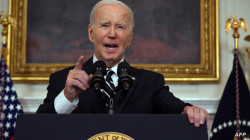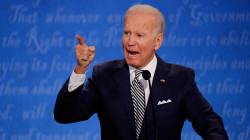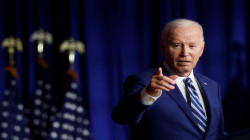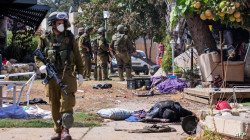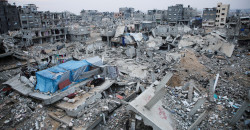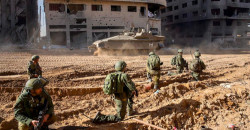Freed Hamas hostage recounts ordeal, slams Israeli failures, speaks well of captors
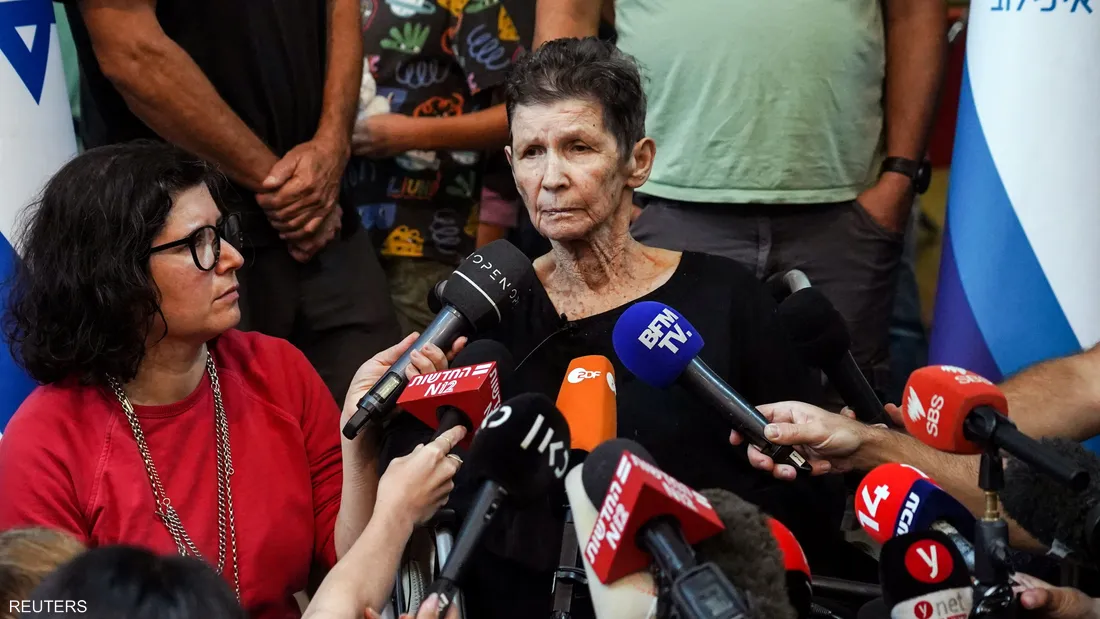
Shafaq News/ Released Hamas hostage Yocheved Lifshitz, 85, described Tuesday at a widely attended press conference outside Tel Aviv’s Ichilov Hospital how her Hamas captors took her by motorcycle from Kibbutz Nir Oz to the Gaza Strip on October 7 and into a “spiderweb” of tunnels, and accused Israel’s leadership of failures that made her and others into “scapegoats.”
She said her abductors beat her on the way to Gaza, but that she was treated well by her captors.
The event, with Lifshitz’s extensive and repeated description of the care she and other hostages received in captivity, was quickly criticized by some Israeli PR professionals and commentators as a major Israeli misstep and a propaganda victory for Hamas. While Lifshitz was not directly criticized, the government was blamed by some for failing to oversee the event, and the hospital was blamed by others for arranging it.
“I went through a hell that we’d never imagined. They [Hamas] rampaged through the kibbutz,” she said, her voice barely a whisper. She derided Israel’s costly border fence with Gaza, which she said the Hamas fighters blew up with ease and had been “no help at all” in defending the settlement.
Some 180 of the settlement’s 400 residents were killed or abducted, according to The New York Times.
Hamas released Lifshitz and Nurit Cooper, 79, after 17 days in captivity, the third and fourth captives freed by the Islamic group in recent days. The two were released from Gaza into Egypt late Monday, and were then transferred to the Israeli army, which brought them to an Israeli hospital for examination, where doctors said they were in good health.
At least 220 others — including the respective husbands of both women, Amiram Cooper, 84, and Oded Lifshitz, 83 — are believed to still be held hostage by Hamas.
In Gaza, she was brought to the entrance of a tunnel network, which she described as “a spiderweb,” and had to walk for kilometers through tunnels “on wet ground, with damp all the time.”
After some two-three hours, they reached a large hall where about 25 other hostages were gathered. “They told us they believe in the Quran and would not harm us, that they would give us the same conditions as they have in the tunnels,” Yocheved said of her captors.
She and about four other hostages from the settlement Nir Oz were taken later that day into a separate room.
“A medic and a doctor came,” and the hostages were put on mattresses, she said. The doctor returned every couple of days, and the medic arranged for medicines. “The treatment of us was good,” Lifshitz added, describing how the medic treated another of the hostages who was injured. She said her captors made sure the conditions were sanitary. “They cleaned the toilets, not us,” she said. “They were afraid of contagion.”
Asked about conversations with the captors, she said “they tried” to converse; “we told them, no politics… We didn’t answer them [on politics]. They talked about all kinds of things. They were very friendly to us. They took care of all of our needs; this must be said to their credit. We ate what they did,” she said, describing one meal a day of pita, cheese and cucumber.
She said “the lack of knowledge by the Israeli army and Shin Bet” about what Hamas had been planning “hurt us badly. We were the scapegoats for the leadership.” The signs were there ahead of the onslaught, including balloons flown over the border to set fire to nearby fields. “And the IDF, somewhere, didn’t take it seriously.”
“And suddenly on Shabbat morning, when everything was quiet, there was very heavy shelling on the communities, and along with the shelling, the mob burst in, burst through the [border] fence… opened the gate of the kibbutz and broke in en masse. It was very unpleasant, very difficult. My memory keeps replaying those pictures.”
She said her captors had plainly prepared long ahead for holding hostages, and even had shampoo and conditioner for them.
Asked why she shook hands, apparently with one of her captors, when she was transferred to a Red Cross ambulance, she repeated again that the hostages were treated with “sensitivity.”
She said she was happy to hear her mother was well treated, but stressed that she did “not know” how other hostages were being treated because her mother only saw about 25 fellow captives.
Lifshitz’s husband remains in Hamas captivity, and Luton said the family still has no information on his fate.
“He was not with my mom, so my mom doesn’t know where he is,” she told the BBC in an interview.
“My father was getting more frail. He was very involved in rights for Palestinians and working towards peace with our neighbors,” she said, adding that he was a long-time campaigner for coexistence with the Palestinians.
“And I hope that he’s there and he’s being looked after and he’s got the chance to talk,” she said. “He speaks good Arabic, so can communicate very well with the people there. He knows many people in Gaza. I want to think he’s going to be okay.”
Widespread criticism erupted in the wake of Lifshitz’s press conference, given her praise for her Hamas captors and criticism of Israel.
The Kan public broadcaster reported Israeli PR experts calling the decision to put Lifshitz in front of cameras a “mistake.” It noted that international media was now reporting on Hamas’s kindness in taking care of the hostage’s needs.
In Israel Hayom, columnist Eddie Rothstein called the interview a “propaganda win for Hamas.”
“What a brave and enlightened woman, the kind we thought they no longer make in Israel, and what clumsy handling of the event,” he wrote. “The truth is you don’t need to be a PR expert to know you can’t have a press conference like this live on TV.”
“There’s no doubt that Lifshitz’s statement could have been managed better,” tweeted Channel 12 reporter Daphna Liel, who added that Lifshitz’s descriptions of her ordeal were still pretty shocking. “Anyone sane should understand that medical attention she was given [by Hamas] was intended to keep their bargaining chips alive and not from the kindness of their hearts.”
The channel’s Dana Weiss called the press conference a “disaster,” and noted the lack of state oversight of the event.
ToI’s Tal Schneider tweeted criticism of the hospital’s spokesperson, who put Lifshitz in front of the cameras, rather than just her family members, and bragged about his ability to get a “wow factor” for journalists on Instagram. “From a professional point of view, this is an embarrassment for the hospital,” she wrote on X.
Yocheved’s son Yizhar said after the press conference that his mother had been debriefed “sensitively” by the Shin Bet on Monday night. He said she had spoken her mind at the press conference, and would never say anything anyone had asked her to say.
The government thanked both Egypt and the Red Cross Monday night for their roles in freeing and transporting Lifshitz and Cooper, and vowed to “continue to work to the best of our abilities and with full effort to locate all the missing and bring all the hostages home.”
On Tuesday morning, Israeli Army Spokesman Rear Adm. Daniel Hagari thanked Egypt for playing a “key role” in the release of the two Israeli hostages.
“We are happy for their return, but at the same time, I want to mention that the husbands of Yocheved [Lifshitz] and Nurit [Cooper] are still being held captive by Hamas. They are just two among the 222 hostages,” he said.
He said the army had worked for their release and that “Egypt played a key role in the issue. Its efforts are appreciated. We thank Egypt and the Red Cross and we are committed to returning all the hostages home.”
On Friday evening, Hamas released two American-Israelis, mother and daughter Judith and Natalie Ra’anan, also via the Rafah crossing with Egypt.
The two were handed over to the Red Cross, which then handed them over to Tel Aviv. Hamas also said that release was made “for humanitarian reasons.” Eight other members of Judith and Natalie’s extended family are among the hostages. Two members of the extended family were reportedly killed in the October 7 attack.
US officials over the past week have reportedly been urging Israel to delay its ground operation in the Gaza Strip to allow more time for negotiations to release more hostages.
